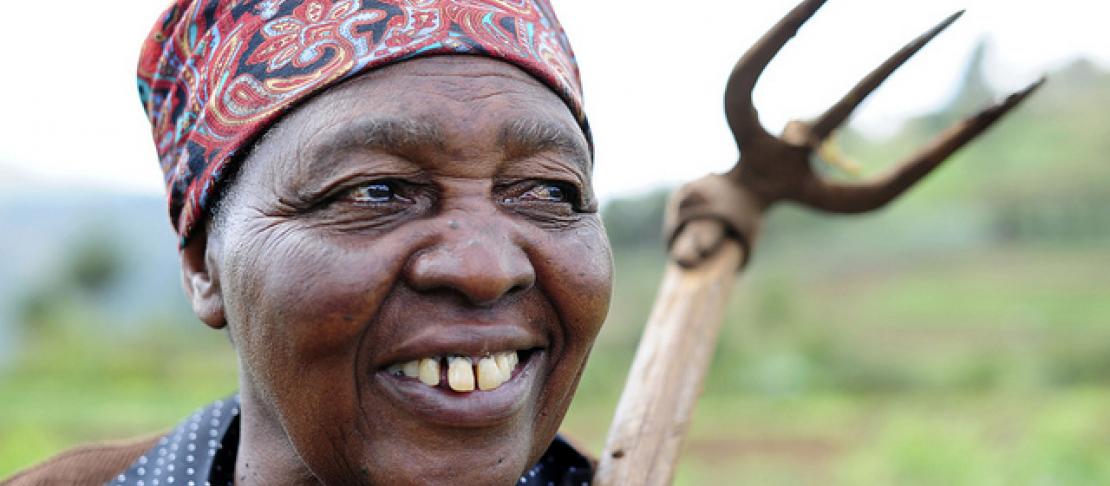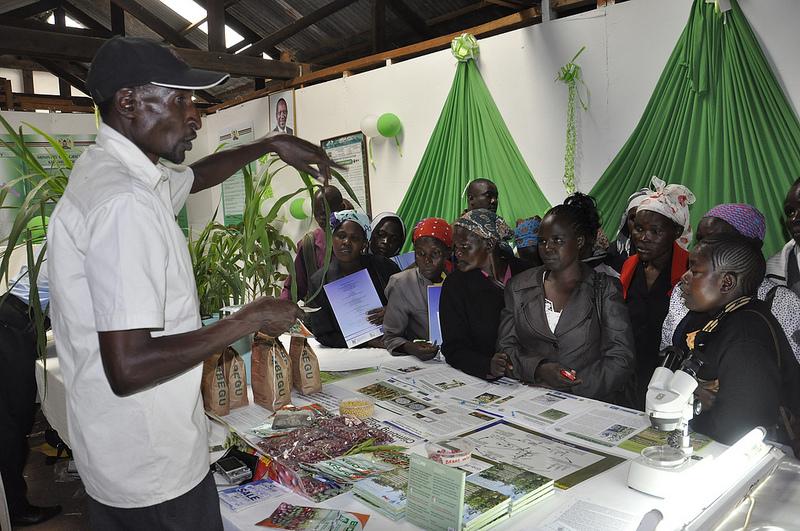Empowering women farmers to feed the world

Women from the climate-smart village project in Nyando Kenya were invited as participants to a climate-smart agriculture training, held in the midst of the Agricultural Society of Kenya (ASK) Kisumu Regional Fair. The session ended up attracting about 160 women wanting to learn more about how to best combat weeds and pests, grow vegetables and how to adapt crops to an unpredictable weather and more.
Dick Morgan, a champion farmer taking the lead on implementing climate-smart agriculture practices on his farm, got the opportunity to teach others about these practices during the training:
¨Have any of you experienced the Striga weed on your farm?" asked Dick the large group of women farmers.
'Kayongo', as the weed is locally known in Western Kenya, is a farmer’s worst enemy. It grows everywhere, even if there is low soil fertility, sucking up all the nutrients. It suppresses cereal crops such as maize and sorghum leading to yield losses of between 30 and 100 percent sometimes”, champion farmer Morgan explained further to the farmers.

Champion farmer Dick Morgan explains how to control the Striga weed best. Photo: V. Atakos (CCAFS EA)
So how can I get rid of the weeds and the pests on my farm?” inquired participant Zeddy Ngeny to the organisers.
According to farmer Morgan, who is working closely with researchers from the International Centre of Insect Physiology and Ecology (ICIPE), the solution could be adopting the climate-smart push-pull technology.
The push-pull technology was developed by ICIPE in close collaboration with the Kenya Agricultural Research Institute (KARI), Rothamsted Research, farmers and other partners.
Morgan explained to the women how this technology is increasing farm production by controlling striga weed, stem borer pests and improving soil fertility.
The push-pull technique is very simple: Cereals are intercropped with a plant such as desmodium that drive the stem borers away from the cereal crop (push) to another plant (Napier grass) grown around the intercrop (pull). This leaves the cereal crop protected. In addition, desmodium encourages the germination of striga seeds but inhibits any further growth.
With the push-pull technology, a farmer can therefore both get a good harvest while being provided with fodder for their farm animals. This technology, which has been in existence for over ten years, has been modified to cope with climate change.
More practices that could improve crop production
The farmers also learnt that they could use improved seeds. The 'IR 303' maize variety that has the ability to kill striga. This seed variety was developed through collaborative research by the International Maize and Wheat Improvement Centre (CIMMYT), KARI and the private sector.
To access further information about improved seed varieties and how to combat pests and diseases, the women farmers where introduced to E – extension services.
Currently, one government extension officer is expected to attend to 1,200 farmers. E-extension services are helping us bridge the gap since it’s impossible to get to all farmers”, explained Thaddeus Ouko, the Nyando sub-county Agriculture Officer.
The group was encouraged to take advantage of new online farm services to get relevant updates, especially on improved seeds and how to manage pests and diseases.
The group also got shown how they could do multi-story gardening, an easy and cost-efficient way of producing more vegetables, and keep keyhole gardens, a drought tolerant composting area for fruits and vegetables. Another technique is keeping an integrated farming system comprising of fish, vegetables and rabbits.

The group learns more about vegetable farming. Photo: V. atakos (CCAFS EA)
The group also got a chance to visit the farm section of the Ministry of Agriculture.
Overall the training had the ambition of:
- Exposing women farmers to options that will improve their adaptive capacity and support knowledge transfer;
- Improving farmers understanding of appropriate agricultural practices and tools that they can use on their farms;
- To link women to finance and insurance -schemes.
Photos: View pictures from this training involving women farmers in Nyando on our Flickr account
Learn more about our climate-smart village activities:
- What are Climate-Smart Villages?
- Kenyan farmers battle hunger with chicken, goats and bees
We have invited journalists to visit our activities in Nyando and the climate-smart villages to learn more: Media visit to Nyando Climate Smart Villages
We hope to be able to provide you with updates from these visits on our blog soon.
Scolastica Tuwei and Caroline Atieno are Women Empowerment Specialists who work closely with farmers in Nyando. John Recha, Catherine Mungai and Vivian Atakos are part of the CCAFS East Africa team based in Nairobi - Kenya. Follow East Africa on Twitter: @Cgiarclimate_ea



